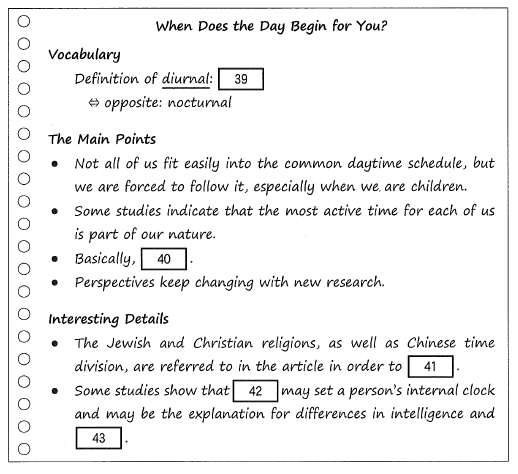問題
Your study group is learning about “how time of day affects people.” You have found an article you want to share. Complete the summary notes for your next meeting.
When Does the Day Begin for You?
When asked “Are you a morning person?” some reply “No, I’m a night owl.” Such people can concentrate and create at night. At the other end of the clock, a well-known proverb claims: “The early bird catches the worm,” which means that waking early is the way to get food, win prizes, and reach goals. The lark is a morning singer, so early birds, the opposite of owls, are larks. Creatures active during the day are “diurnal” and those emerging at night are “nocturnal.”
Yet another proverb states: “Early to bed, early to rise makes a man healthy, wealthy, and wise.” Larks may jump out of bed and welcome the morning with a big breakfast, while owls hit the snooze button, getting ready at the last minute, usually without breakfast. They may have fewer meals, but they eat late in the day. Not exercising after meals can cause weight gain. Perhaps larks are healthier. Owls must work or learn on the lark schedule. Most schooling occurs before: p.m., so young larks may perform certain tasks better. Business deals made early in the day may make some larks wealthier.
What makes one person a lark and another an owl? One theory suggests preference for day or night has to do with time of birth. In 2010, Cleveland State University researchers found evidence that not only does a person’s internal clock start at the moment of birth, but that those born at night might have lifelong challenges performing during daytime hours. Usually, their world experience begins with darkness. Since traditional study time and office work happen in daylight, we assume that day begins in the morning. People asleep are not first in line, and might miss chances.
Does everyone follow the system of beginning days in the morning? The Jewish people, an approximately 6,000-year-old religious group, believe a day is measured from sundown until the following sundown─from eve to eve. Christians continue this tradition with Christmas Eve. The Chinese use their system of 12 animals not only to mark years, but to separate each two-hour period of the day. The hour of the rat, the first period, is from 11:00 p.m. to 1:00 a.m. Chinese culture also begins the day at night. In other words, ancient customs support how owls view time.
Research indicates owls are smarter and more creative. So, perhaps larks are not always wiser! That is to say, larks win “healthy” and sometimes “wealthy,” but they may lose “wise.” In an early report, Richard D Roverts and Patrick D. Kyllonen state that owls tend to be more intelligent. A later, comprehensive study by Franzis Preckel, for which Roberts was one of the co-authors, came to the same conclusion. It is not all good news for owls, though. Not only can schoolwork be a challenge, but they may miss daytime career opportunities and are more likely to enjoy the bad habits of “nightlife,” playing at night while larks sleep. Nightlife tends to be expensive. A University of Barcelona study suggests larks are precise, seek perfection, and feel little stress. Owls seek new adventures and exciting leisure activities, yet they often have trouble relaxing.
Can people change? While the results are not all in, studies of young adults seem to say no, we are hard-wired. So as young people grow and acquire more freedom, they end up returning to their lark or owl nature. However, concerns arise that this categorization may not fit everyone. In addition to time of birth possibly being an indication, a report published in Nature Communications suggests that DNA may also affect our habits concerning time. Other works focus on changes occurring in some people due to aging or illness. New research in this area appears all the time. A study of university students in Russia suggests that there are six types, so owls and larks may not be the only birds around!
Your summary notes:

問1 Choose the best option for ( 39 ).
- achieves goals quickly
- likes keeping pet birds
- lively in the daytime
- skillful in finding food
問2 Choose the best option for ( 40 ).
- a more flexible time and performance schedule will be developed in the future
- enjoying social activities in the morning becomes more important as we age
- it might be hard for us to change what time of day we perform best
- living on the owl schedule will eventually lead to social and financial benefits
問3 Choose the best option for ( 41 ).
- explain that certain societies have long believed that a day begins at night
- indicate that nocturnal people were more religious in the past
- say that people have long thought they miss chances due to morning laziness
- support the idea that owls must go to work or school on the lark schedule
問4 Choose the best options for ( 42 ) and ( 43 ).
- amount of sleep
- appearance
- behavior
- cultural background
- religious beliefs
- time of birth
【解説】問1
Choose the best option for ( 39 ).
( 39 )に最適な選択肢を選べ
Your summary notes: にある、( 39 )の部分を確認しましょう。
Vocabulary
Definition of diurnal: ( 39 )
⇔ opposite: nocturnal
diurnal の意味が何かという問題ですね。diurnal や nocturnal は、本文の第一段落の最後にこうあります。
Creatures active during the day are “diurnal” and those emerging at night are “nocturnal.”
日中に活動する生き物は diurnal であり、夜に出現する生き物は nocturnal です。
選択肢を確認しましょう。
1. achieves goals quickly
目標をすばやく達成する
2. likes keeping pet birds
ペットの鳥を飼うのが好き
3. lively in the daytime
昼間は元気
4. skillful in finding food
食べ物を見つけるのが上手
diurnal は日中に活動する動物です。ということで、正解は「3」です。

ちなみに diurnal は「昼行性」、nocturnal は「夜行性」です。ですが、それを知っている必要はありません。本文でちゃんと説明してくれていますからね。
【解説】問2
Choose the best option for ( 40 ).
( 40 )に最適な選択肢を選べ
Your summary notes: にある、( 40 ) は Your summary notes: の The Main Points の4つの項目のうちの一つです。
The Main Points の内容を確認してみましょう。一つ目はこうです。
Not all of us fit easily into the common daytime schedule, but we are forced to follow it , especially when we are children.
私たち全員が一般的な日中のスケジュールに簡単に適合するわけではありません。しかし特に子供である場合は、それに従うことを余儀なくされています。
第二段落にその辺の話がありましたね。
The Main Points の二つ目はこうです。
Some studies indicate that the most active time for each of us is part of our nature.
いくつかの研究は、私たち一人一人にとって最も活動的な時間は、特徴の一部であることを示しています。
第三段落にその辺の話がありましたね。
The Main Points の最後はこうです。
Perspectives keep changing with new research.
考え方は新しい研究とともに変化し続けています。
これは最終段落の最後の結論の内容です。では選択肢を確認しましょう。
1. a more flexible time and performance schedule will be developed in the future
より柔軟な時間とパフォーマンスのスケジュールが将来的に開発されます
「普通仕事は日中に行われるので、夜型の人はチャンスを逃すかもしれない」みたいな話はありました。ですが、フレックスタイムの話はありませんでした。この選択肢は違います。
2. enjoying social activities in the morning becomes more important as we age
朝の社会活動を楽しむことは、私たちが年をとるにつれてより重要になります
そんな話はありませんでしたね。この選択肢も違います。
3. it might be hard for us to change what time of day we perform best
最高のパフォーマンスを発揮する一日の時間を変更するのは難しいかもしれません
本文第三段落にこうあります。
One theory suggests preference for day or night has to do with time of birth.
ある理論によれば、昼か夜かの好みは生まれた時間と関係があります。
また最終段落の最初にこうあります。
Can people change? While the results are not all in, studies of young adults seem to say no, we are hard-wired.
人は変わることができますか? 結果がすべてではありませんが、青少年の研究では変わらない、生まれつきだと言っているようです。
「朝型」や「夜型」というものは生まれつきのもので、変わらないという話です。この選択肢が正解です。
4. living on the owl schedule will eventually lead to social and financial benefits
フクロウ型のスケジュールで生活することは、最終的には社会的および経済的利益につながります
第五段落にこうあります。
It is not all good news for owls, though. Not only can schoolwork be a challenge, but they may miss daytime career opportunities
しかし、フクロウ型にとってすべてが良いニュースというわけではありません。学業は困難であるだけでなく、彼らは日中のキャリアの機会を逃すかもしれません
選択肢の内容とは逆のことを言っていますね。この選択肢は違います。
ということで、正解は「3」です。

The Main Points の問題に関係しない部分は、特に読む必要はありません。ですが、本文の内容を要約してくれているのですから、さらっと目を通しておくのはいいと思います。
【解説】問3
Choose the best option for ( 41 ).
( 41 )に最適な選択肢を選べ
( 41 )があるのは、Interesting Details の一つ目です。そこを見てみましょう。
The Jewish and Christian religions, as well as Chinese time division, are referred to in the article in order to ( 41 ).
ユダヤ教とキリスト教、そして中国の時間の区切りは、( 41 )ために記事で言及されています。
Jewish や Christian そして Chinese に関しては、第四段落にあります。
The Jewish people, an approximately 6,000-year-old religious group, believe a day is measured from sundown until the following sundown
創立約6,000年の宗教団体であるユダヤ教の人は、1日は日没から次の日没までで測定されると信じています。
また第四段落には、このような内容もあります。
Chinese culture also begins the day at night.
中国文化もまた、夜から一日が始まります。
そして第四段落は、こう締めくくられます。
In other words, ancient customs support how owls view time.
言い換えれば古代の慣習は、フクロウ型の人たちが時間を見る方法を支持しています。
選択肢を確認してみましょう。
1. explain that certain societies have long believed that a day begins at night
特定の社会は一日が夜に始まると長い間信じてきたと説明する
2. indicate that nocturnal people were more religious in the past
夜行性の人々が過去により宗教的であったことを示す
3. say that people have long thought they miss chances due to morning laziness
人々は朝の怠惰のためにチャンスを逃すと長い間考えていたと言う
4. support the idea that owls must go to work or school on the lark schedule
フクロウ型はヒバリ型のスケジュールで仕事や学校に行かなければならないという考えを支持する
確認してきた第四段落の内容から考えて、正解は「1」です。

中国の子の刻は午後11時から午前1時だから、中国文化は夜から一日が始まるという例は、どうなんでしょう。それを言い出したら、私たちが使っている時計も真夜中が0時ですもんね。なんかもやっとしました。
【解説】問4
Choose the best options for ( 42 ) and ( 43 ).
( 42 )と( 43 )に最適な選択肢を選べ
( 42 )と( 43 )があるのは、Interesting Details の二つ目にあります。一つの文章ですが、まずは前半部分を確認しましょう。
Some studies show that ( 42 ) may set a person’s internal clock
いくつかの研究は、( 42 )が人の体内時計を設定するかもしれないと示しています
これに関しては、問2で確認しましたね。本文第三段落にこうあります。
One theory suggests preference for day or night has to do with time of birth.
ある理論によれば、昼か夜かの好みは生まれた時間と関係があります。
それを踏まえて選択肢を確認しましょう。
1. amount of sleep
睡眠の量
2. appearance
外見
3. behavior
行動
4. cultural background
文化的背景
5. religious beliefs
宗教的信念
6. time of birth
生まれた時間
先ほど確認した本文に「time of birth」と書いてありますね。ということで、( 42 )→「6」です。
それを踏まえて Interesting Details の二つ目を確認しましょう。
Some studies show that (time of birth) may set a person’s internal clock and may be the explanation for differences in intelligence and ( 43 ).
いくつかの研究は、(生まれた時間)が人の体内時計を設定する可能性があり、知能と( 43 )の違いの説明になる可能性があることを示しています。
「体内時計」が何の違いをもたらすのかという話です。
第二段落にこうあります。
Larks may jump out of bed and welcome the morning with a big breakfast, while owls hit the snooze button, getting ready at the last minute, usually without breakfast.
ヒバリ型はベッドから飛び出して朝を大歓迎し、フクロウ型はスヌーズボタンを押して、通常は朝食なしで土壇場で準備をします。
また第五段落にはこういうことも書かれてあります。
and are more likely to enjoy the bad habits of “nightlife,” playing at night while larks sleep.
そしてヒバリ型が眠っている間に、(フクロウ型は)夜に遊ぶ「ナイトライフ」の悪い習慣を楽しむ可能性が高くなります。
それを踏まえて選択肢を確認してみましょう。
1. amount of sleep
睡眠の量
2. appearance
外見
3. behavior
行動
4. cultural background
文化的背景
5. religious beliefs
宗教的信念
6. time of birth
生まれた時間
確認した本文の内容はどちらも睡眠に関係していると言えば、そんな感じがします。「3」を選びたくなるでしょうか? ですが、睡眠の「量」ではありませんね。睡眠の「時間帯」だったなら正しそうですけれど。
後は消去法で消していくと、残るのは「3」の「behavior / 行動」くらいですね。ということで( 43 )→「3」です。

朝型・夜型は生まれつきで変えられない、また夜型のほうが知能が高い可能性があるという内容! 丸々信じるのはどうかと思いますが、なかなか興味深い内容でした。



コメントをどうぞ